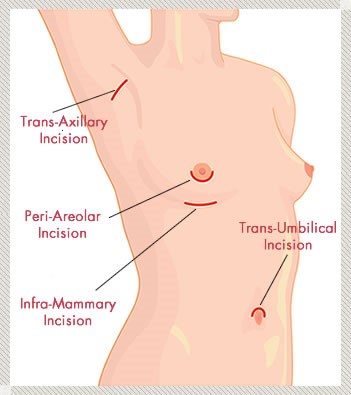Breast Implant Incision
Your complete guide and quick links to everything you want to know about Breast Implant Incision choices in Sydney!

| Advantages | Disadvantages | |
|---|---|---|
| Infra-Mammary (incision in the fold under the breast) | The most popular choice with patients. Provides the best visibility of the implant pocket during the surgery. Any size or shape of implant can be inserted. Drains are not necessary. Any future revision surgery can be performed through the same scar. | Leaves a scar in the fold under the breast. Although the scar should hide well in the fold when standing, it can be more visible when lying down. Asian or brown skin has a higher risk of forming brown pigmented scars. Pigmented, thick or keloid scars could mar the appearance of an otherwise beautiful result if you are prone to them. |
| Trans-Axillary (via the armpit) | The scar is placed in an inconspicuous skin crease within the armpit. No visible ‘tell-tale’ scars on or around the breast. An option worth consideration in those with brown or Asian skin who are likely to form brown pigmented scars, or those with a history of thick or keloid scars. (Please note that the same type of scars could still occur in the armpits, the only difference being that they would be hidden in the armpits instead of being more visible under or on the breasts). | Although any size fillable saline implant can be inserted via this route, the small incision does limit the size a silicone implant can be inserted. Only round implants can be inserted via this route. Teardrop implants cannot be inserted via this route. Drains are always used – these are usually removed the following day. Any future revision surgery would likely need the infra-mammary route thereby creating a second scar. |
| Peri-Areolar (around the edge of the areola – the pigmented circle around the nipple) | Scar may be less conspicuous than with the infra-mammary incision. | The small incision limits this approach to small silicone implants or any size fillable saline implants. The dissection could sever some of the milk ducts and interfere with future breastfeeding. It has also been suggested that this route could cause ‘seeding’ of the resident nipple duct bacteria into the implant pocket and cause a pocket infection. Any future revision surgery would most likely need the infra-mammary route thus creating a second scar. |
| Trans-Umbilical (through the navel) | The scar is very small and located well away from the breast. | Not popular or commonly performed in Australia. The passage of the surgical instrument can leave grooves under the abdominal skin. Only possible with fillable saline implants. Difficult to create an aesthetic and refined implant pocket from such a distant entry point. Any future revision surgery would need to be done through the infra-mammary route. |
Watch Our ‘Breast Augmentation’ Animation Video
Breast Implants 'Before & After'
Round Silicone Breast Implants

Available in either Smooth or Textured Implant Surfaces
Preferred by those wanting a fuller upper breast ‘look’ or those with significant loss of upper breast volume after pregnancy or major weight loss.
Teardrop Silicone Breast Implants

For breasts that look natural in shape and not ‘stuck-on’!
An implant shape to deliver a natural, straight-line drape of skin from collarbone to nipple instead of a ‘stuck-on look’ that can occur with some Round Implants
Asian Breast Augmentation

Special considerations are essential in Asian Breast Augmentation!
For optimal results, special considerations in terms of implant type, shape, size and surgical technique are essential in Asian Breast Augmentation.
Trans-Axillary Breast Augmentation

Avoids a tell-tale scar anywhere on, or under, the breasts!
The ‘Armpit Approach’ involves inserting an implant through a small incision in a skin crease of the armpit – thus avoiding a scar anywhere on, or under, the breast.
Dual Plane Breast Augmentation

To correct early sagging at the same time!
Our preferred implant placement when there is only mild sagging but not enough to warrant the more invasive ‘lift’ surgery techniques.
